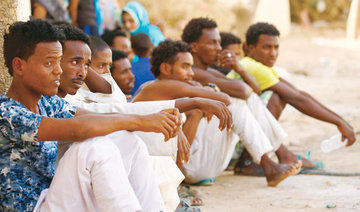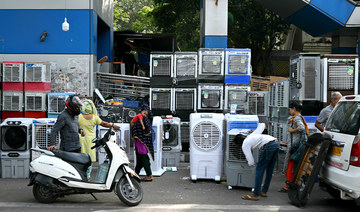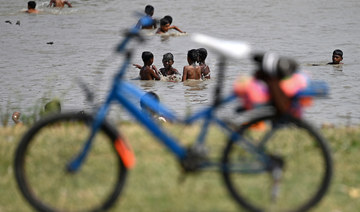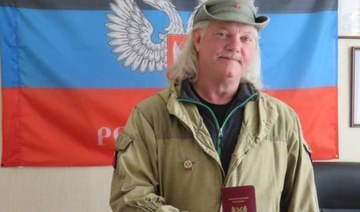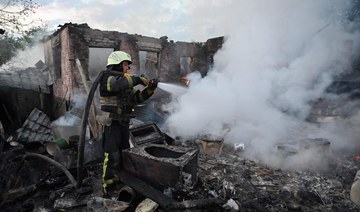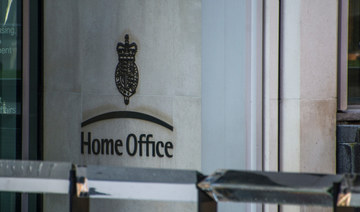NIGER: With tens of thousands of migrants flooding into the desert city of Agadez en route to Europe, Africa’s smuggling capital enjoyed a surge in business which boosted the local economy.
But a government ban on the transportation of migrants has hit business badly, leaving disgruntled locals out of pocket.
“It’s as if you smacked a child without saying what it had done wrong,” explains Issouf Maha, mayor of Tchirozerine, a town in central Niger which lies on the edge of the Sahara, just north of Agadez.
In May 2015, the government in Niamey adopted a law banning the illegal trafficking of migrants with those found guilty facing a prison sentence of between one and 30 years, and fines of up to 30 million CFA francs (45,000 euros/$51,000).
It was only in August 2016 that the government began “rigorously” applying it, Interior Minister Mohamed Bazoum told AFP.
Since then, “more than 100 people smugglers” have been arrested, around a hundred vehicles seized and “nearly 7,000 migrants” brought back to Agadez, Bazoum said, indicating the importance of cracking down on all forms of smuggling.
“All trafficking is interlinked” whether it be in migrants, weapons or drugs, he said.
As a result of the crackdown, both smugglers and fixers have found themselves at a loose end.
But it’s not only them: shops, banks and lorry drivers are also feeling the absence of the thousands of migrants who, despite their extreme poverty, have stimulated the economy in this impoverished desert city that is a key transit point for those heading to Europe.
“Me, I just help one of the fixers. Now the police are calling us ‘accomplices’,” says Achama Akomili, 35, describing the criminalization of an activity which only three months ago was legal.
“Before I was earning a good living. I paid my rent through the migrants and the fixers. With that I could feed my wife and help my family. At the moment, it’s not going well.
“We carry on because there’s no other work. We’ve got no choice. Before I was earning between 30,000-40,000 CFA francs per day (45-60 euros).
“But now, I can go a whole week without earning anything,” he complains.
And one day soon, he himself might have to join “the exodus” heading north, Akomili says.
Taher Soufiane, who has been driving migrants to the border since 2013, is also at a loose end after being arrested on the road with around 20 people in the back of his pick-up truck.
“We didn’t know it was forbidden,” says this 29-year-old father-of-three.
After several days in jail, he appeared before a judge and was released. But he’s not clear whether it’s a provisional release before a trial or whether he’s been handed a suspended sentence.
“They just told me that if I do it again, I will go to prison for a long time. They took my car and my work and now I just sit around all day,” he complains.
“Why is Europe banning this without giving us anything?“
In the market, trader Issouf Halidou says he too has seen his business hit by the crackdown on people smuggling.
“I’m not selling anything any more. Business is at a standstill,” he grumbles.
His stall is packed with all the paraphernalia sought by migrants taking the long desert journey north: for 500 CFA francs (75 centimes, 85 cents), you can buy a small water bottle, gloves, a balaclava and sunglasses.
For a little more, there is also food: milk for about 2.0 euros, cassava for 1.50 and sugar for 90 centimes. But now he doesn’t know what to do with his stock.
The banks are also quiet, the walls covered with ads for money transfer services — MoneyGram, Western Union, Allzza and others — giving just a brief glimpse of multiple transfers they once handled.
“Before there was always a queue in front of the banks. There might be more than 300 migrants a day going into a branch! Today there’s no one or nearly no one,” said one bank employee, speaking on condition of anonymity.
“It’s hard to know exactly what the shortfall is but there’s definitely an impact, that’s for sure. It’s a loss for the region,” he told AFP, saying the banks would likely start making staff redundant if the ban wasn’t lifted.
The government is aware of the problems.
“The criticism is well founded,” admits Interior Minister Bazoum.
“Taking into account the scope of trafficking in illegal migrants, a whole economy grew up around it which provided a living for many people.
“There is a need and we have committed to developing an alternative to this criminal economy.”
Backed by Europe, Niger embarked on a 460-million-euro program to address “all spheres of activity,” Bazoum said, indicating that it would address both economic and security issues.
But not much of it is likely to make an impact in Agadez.
“When are we going to see the money that Europe has given? There are all these meetings but there’s never anything for us. We have women and children to feed and we’re waiting,” complained Abdoulaye Alora, a 45-year-old fixer.
For the Tchirozerine mayor, the fear is that the ban on transporting migrants will push those desperate for work into the arms of other criminal groups, such as those trading in cocaine, weapons or stolen cars.
One observer dismissed the European support as meaningless in the effort to cut back migrant flows.
“We should be treating the symptoms and not the causes. As long as there’s more than 50 percent unemployment among young people in African countries, there will be migrants traveling through Agadez and other places.”
From boom to bust: crackdown takes toll on Niger smuggling hub
From boom to bust: crackdown takes toll on Niger smuggling hub
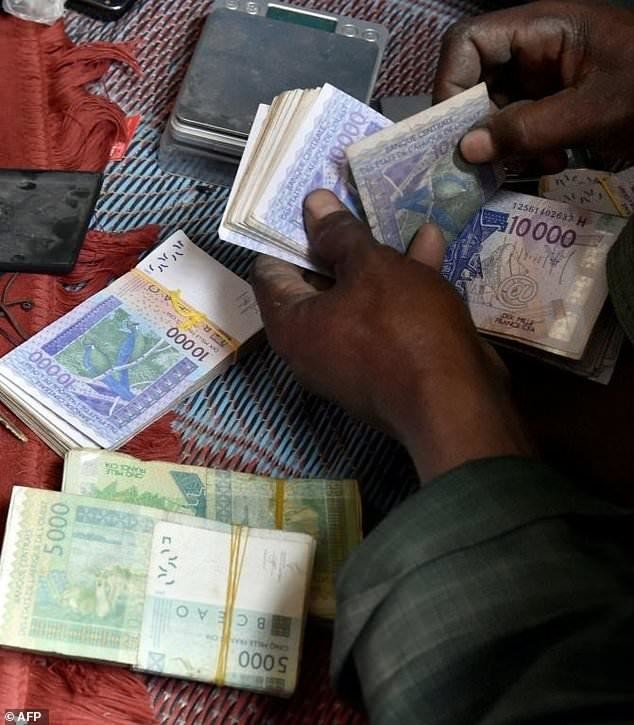
Parts of India boil as temperatures near 50 C
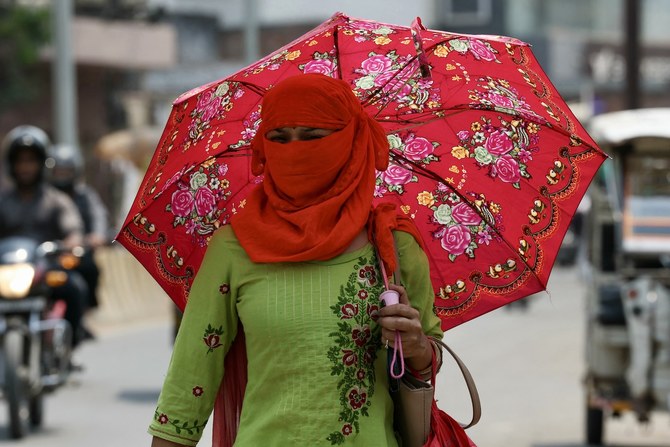
- Delhi and neighboring states are on ‘red alert’ over increasing heat
- Doctors observe a 30 percent jump in heat-related cases in Rajasthan
NEW DELHI: Parts of India continued to reel under a prolonged extreme heat spell on Friday, with temperatures in northern regions expected to soar to nearly 50 degrees Celsius over the weekend.
India’s summer temperatures often peak in May, but heatwave days have been more severe than usual this year.
The Delhi capital region and the nearby states of Punjab, Haryana, Rajasthan, Chandigarh and Uttar Pradesh have been under the India Meteorological Department’s “red alert” — its highest warning — since Wednesday.
Temperatures soared beyond 45 C in many of the regions and touched 48.8 C in Rajasthan’s Barmer city on Thursday — the highest temperature recorded in the country this year so far, which was forecast to increase even further in the coming days.
“The situation has been grim. There is a heatwave in large parts, and it is severe in some pockets in Rajasthan and parts of Punjab and Haryana, and (it’s) likely to continue till the month’s end,” G.P. Sharma, chief forecaster at Skymet, India’s leading weather and agriculture risk consultancy, told Arab News.
“There is going to be no letup in western Uttar Pradesh and Rajasthan and Gujarat … They will have extreme temperatures, reaching about 49 degrees.”
IMD data showed that temperatures in Rajasthan may cross 49.6 C on Sunday.
Devi Singh, a tourism professional working in the state said one had to “feel it to believe” that it could be this hot.
“The heat is too much and people are really suffering,” she told Arab News. “Life has almost come to a standstill. Business has suffered. Very few tourists are coming. In this heat, people don’t want to venture out.”
Not venturing out is also what doctors advise their patients as they observe a rise in heat-related cases.
“We advise them not to leave home after 10 a.m. in the morning, and leave home only after 5 p.m. Even if you have to step out during the daytime, hydrate yourself properly … Consult doctors immediately if you have any symptoms,” said Dr. Vikas Chowdhury from the Thar Hospital in Barmer city.
“There has been an increase of at least 30 percent in patients with heatwave conditions like dryness of throat, dehydration, vomiting, decrease in appetite, a burning sensation and fever.”
Many Indians, however, have to be outside for work.
“I’ve been feeling dizzy because of the heat,” said Shivam Kumar, a cameraman in Delhi, as he prepared to cover the fifth phase of the ongoing general election, which will be held in the capital on Saturday.
“I have to work anyway because inflation is so high. I have to work to survive, as there is so much unemployment.”
American soldier arrested in Russia over an alleged theft will remain in custody, state media report
American soldier arrested in Russia over an alleged theft will remain in custody, state media report

- The soldier, identified by court officials as Gordon Black, will remain in custody at least until July 2
- Officials said that Black, who is married, traveled to Russia to see a longtime girlfriend
MOSOCW: An American soldier arrested in Russia’s far eastern city of Vladivostok on charges of stealing lost an appeal against his detention and will remain in custody, Russian state news agency RIA Novosti reported Friday, citing court officials.
The soldier, identified by court officials as Gordon Black, will remain in custody at least until July 2, the report said, after the Primorsky Regional Court upheld the lower court’s ruling to place Black in custody pending investigation and trial.
Several US officials said earlier this month that Black, a 34-year-old staff sergeant, was stationed in South Korea and was in the process of returning home to Fort Cavazos in Texas. Instead, officials said that Black, who is married, traveled to Russia to see a longtime girlfriend. He was detained in Vladivostok, a major military and commercial Pacific port in Russia’s Far East, and accused of stealing from her.
RIA Novosti said, citing local police, that Black has admitted guilt and is cooperating with investigators.
Black’s arrest further complicates US relations with Russia, which have grown increasingly tense as the war in Ukraine drags on.
Russia is known to be holding a number of Americans in its jails, including corporate security executive Paul Whelan and Wall Street Journal reporter Evan Gershkovich. The US government has designated both as wrongfully detained and has been trying to negotiate for their release.
Others detained include Travis Leake, a musician who had been living in Russia for years and was arrested last year on drug-related charges; Marc Fogel, a teacher in Moscow, who was sentenced to 14 years in prison, also on drug charges; and dual nationals Alsu Kurmasheva and Ksenia Khavana.
Zelensky visits Kharkiv in show of support for city pounded by Russian strikes
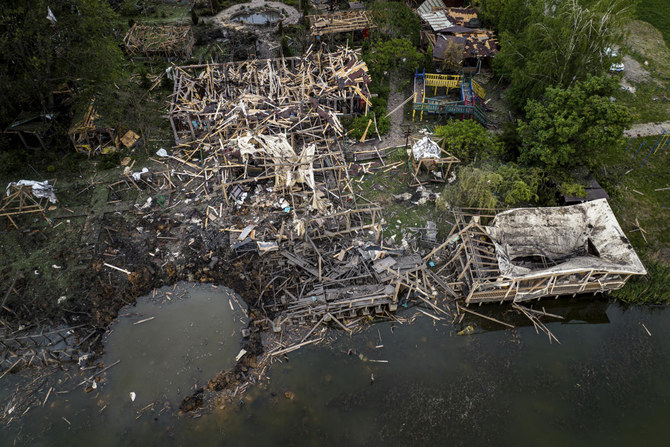
- The Ukrainian leader met senior military leaders in the city and traveled to the site of a major printing house a day after it was destroyed
- “I also received updates on defense operations, particularly in the Vovchansk area, as well as the recovery of damaged energy infrastructure,” Zelensky said on X
KHARKIV: President Volodymyr Zelensky visited Ukraine’s northeastern city of Kharkiv on Friday as it faces intensified Russian air attacks amid an offensive push by Moscow’s forces into the north of the surrounding region.
The Ukrainian leader met senior military leaders in the city and traveled to the site of a major printing house a day after it was destroyed in a Russian missile attack that killed at least seven people.
“Today I am in Kharkiv... I also received updates on defense operations, particularly in the Vovchansk area, as well as the recovery of damaged energy infrastructure,” Zelensky said on X.
Russian forces launched a cross-border assault on May 10, driving toward the border town of Vovchansk on one line of attack and pushing toward the village of Lyptsi on the other.
Oleksandr Syrskyi, Ukraine’s top commander, said on Thursday that Russian forces were locked in street fighting in Vovchansk and that they had moved onto a defensive footing near Lyptsi.
Russia says it wants to set up a “buffer” zone in the region in what it calls a response to Kyiv’s shelling of Russian border regions such as Belgorod. Russia frequently launches air strikes on Ukraine from the region of Belgorod.
The assault opened a new front in the war in what Kyiv said was an effort to divert its outnumbered troops from the east where the fiercest fighting is taking place.
Kharkiv, Ukraine’s second largest city which lies some 30 km from the border with Russia, and the surrounding region have faced daily missile, drone and guided bomb strikes for months.
Most of the energy infrastructure has been severely damaged in the city, which is still home to around 1.3 million people.
“The entire city and region of Kharkiv deserve our support, gratitude, and respect,” Zelensky said.
Sunak urged to ‘safeguard’ UK vote against foreign interference
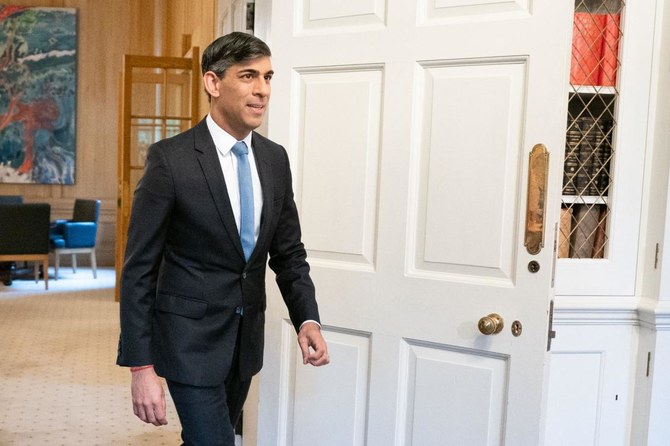
- Letter highlighted findings from security officials that it was “almost certain” Russian actors sought to interfere in the UK’s 2019 vote
- That interference could include cyberattacks, blackmailing of lawmakers, spreading of disinformation online — including AI “deep fakes”
LONDON: UK Prime Minister Rishi Sunak “must be prepared for the possibility of foreign interference” in the election campaign ahead of the July 4 vote, parliament’s security committee warned on Friday.
Margaret Beckett, chair of the Joint Committee on the National Security Strategy (JCNSS), wrote in a letter to Sunak that there had been a “pattern of attempted foreign interference from countries such as China, Russia, Iran and North Korea” in recent years.
The letter highlighted findings from security officials that it was “almost certain” Russian actors sought to interfere in the UK’s 2019 vote, and that China was seeking to influence democratic processes overseas.
“It is our view that the UK must be prepared for the possibility of foreign interference” during the July 4 general election, it added.
That interference could include cyberattacks, blackmailing of lawmakers, spreading of disinformation online — including AI “deep fakes” — and sowing of division on controversial topics.
The government should help educate the public to identify disinformation and ensure the safety of elected politicians, advised the committee.
Beckett, a former foreign secretary in Tony Blair’s Labour government, urged Sunak “to identify any last actions that can be taken collectively in the national interest” before the current parliament is dissolved next week.
Advancements in AI and the deepening of hostilities between the West and nations such as Russia have led experts to warn of an unprecedented threat ahead of the key elections in the UK and the United States this year.
Home Office urged to be flexible on visa laws after baby born in UK is ordered to leave
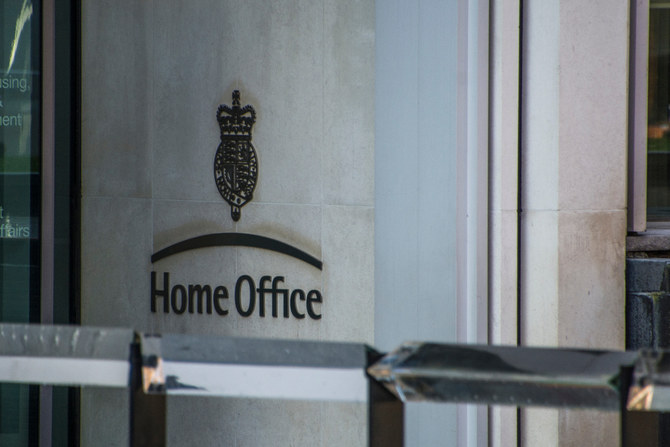
- Massah, 13 months old, does not have settled status despite her Jordanian parents living legally in Britain
- ‘The need to maintain the integrity of the immigration laws outweighs the possible effect on you/your children,’ Home Office tells parents
LONDON: The UK Home Office has been urged to look again at how it enforces visa rules after it threatened a 13-month-old with removal from the country to ensure the “integrity” of immigration law, Sky News reported on Friday.
Massah was born to Jordanian parents in the UK who have been living legally in the country since 2021.
However, the family went on holiday in January this year, before Massah’s status in the UK was confirmed, meaning the child technically reentered the country as a tourist.
Despite applying for a child-dependent visa for the baby girl, her parents were told this month that Massah “will be required to immediately leave the UK.” She will then need to have her visa reapplied for from overseas.
In a letter to Massah’s parents, the Home Office said: “In the particular circumstances of your case, it has been concluded that the need to maintain the integrity of the immigration laws outweighs the possible effect on you/your children.”
Massah’s father Mohammed said the family fear that if they return with Massah to Jordan to reapply, the application will still be dismissed.
He added that he and Massah’s mother are worried about regional instability, and that the situation is giving them sleepless nights.
“I can’t imagine how I can tell (Massah) the story in the future that the country you (were) born (in) asked you to leave while you (were) a year old,” Mohammed told Sky News.
“I’m trying to fix everything. I don’t need to consider a one-year-old infant as an overstayer here.”
A Home Office spokesperson told Sky News: “All visa applications are carefully considered on their individual merits in accordance with the immigration rules.
“We are working closely with the parents of this child to ensure they receive the support and direction they require regarding the application.”
The issue of immigration law is set to become a central point of the UK’s general election, after Prime Minister Rishi Sunak announced this week that the country will go to the polls on July 4.
The announcement came the day before figures were released showing that net immigration to the UK had dropped slightly over the previous 12 months.



